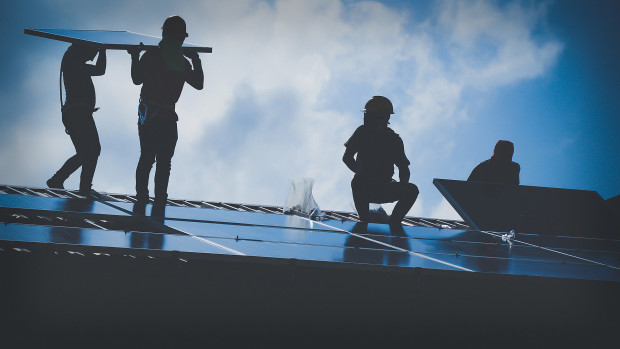
After a rough, low-wattage 2022, the solar energy market is showing signs of life in 2023.
The U.S. solar energy sector is expected to triple its growth rate by 2028, according to a recent report Solar Energy Industries Association. By 2028, the SEIA anticipates a total installed solar capacity of 378 gigawatts, an industry-high.
Thanks to improving supply chain performance and rising demand from consumers and businesses, the U.S. solar sector experienced its top performance ever, installing 6.1 GW in the first quarter of 2023, the DEIA reported.
DON’T MISS: How to invest in solar power
Now Tesla, which has been on the installment side of the solar power industry, wants a bigger bite out of the market and is changing its solar strategy to get the job done.
Tesla had purchased Fremont, Cal.-based SolarCity for $2.6 billion to get a foothold in the nascent solar installation market. Seven years later, the company is morphing from a solar install outfit to a supplier of solar-based products, according to Elektrek, a technology platform that covers emerging technologies.
According to sources familiar with the matter, “Tesla has been laying off staff at energy offices across the U.S.,” says Elektrek co-founder Fred Lambert. “Sources say that more layoffs are expected across the energy division.”
More Tesla:
- Why Tesla stock is going through the roof -- and where it could go next
- Elon Musk's latest Tesla announcement could shake up the entire EV industry
- Elon Musk has a 'purity' around motivation for a game-changing EV deal
The layoffs are expected to pave the way for Tesla to opt for using certified installers and turn its attention to product supply.
“The company will become more of a solar product supplier for other installers with the main goal of deploying its new solar inverter which works with both solar panels or its solar roof as well as Powerwalls,” Lambert says. “Tesla can then use those products to deploy virtual power plants and Tesla Electric.”
Tesla’s ownership of Solar City has been rocky. Tesla CEO Elon Musk was a SolarCity board member prior to the purchase and the energy company was founded by Lyndon and Peter Rive, Musk’s cousins.
Soon after the purchase, whistleblowers cited property damage, safety issues, and poorly run company operations. Musk also found himself defending the SolarCity purchase from shareholders who claimed the purchase was more a bailout than a shrewd business decision.
With its shift to supply and away from installation, Tesla is looking to refurbish its clean brand and possibly its reputation, which could be enough to put Tesla and Musk in the black on its solar energy bottom line - and in the headlines once again.







